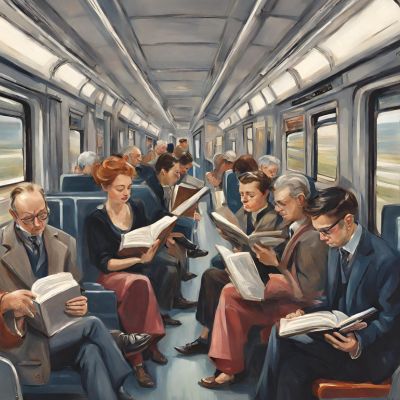
As a boy, when I would get on the commuter train to go sightseeing in London during the holidays, every seat was filled with people deeply engaged in reading—newspapers unfolding with rustling crinkles, paperback novels propped discreetly open on laps, businessmen poring over journals or reports. The train was a traveling library. But take a train ride today and the scene has changed dramatically. Now, the seats are filled with heads bowed down, fingers tapping and swiping. Everyone is scrolling. You see them on subways, waiting in lines, even sitting across from you at a coffee shop. Their eyes are glued to tiny screens as they scroll through social media or watch videos. It is much rarer to see a book in their hands.
In fact, some people don’t read books at all. Apart from being forced to at school a book never enters their life after this point.
And there are a lot more of them than you might think. According to recent surveys, over 1 in 4 American adults haven’t read a single book in the past year. That’s over 80 million people! Now I’m not here to judge or shame anyone for what they choose to do in their free time. But I do think this trend says something important about the direction our society is headed.
Books have been the primary method of spreading ideas for thousands of years. They helped advance science, philosophy, democracy – you name it. The printing press was one of the most important inventions in history because it took the magic of books and put it into the hands of regular people. It helped usher in the Renaissance, the Enlightenment, and pretty much every major cultural movement since then.
Would You Vote For A President Who Doesn’t Read?
Imagine the reaction if a major presidential candidate admitted that they hadn’t read a book for pleasure from cover to cover in over two decades. In a political climate where every personal detail is scrutinized, such a revelation would certainly raise eyebrows.
Many voters see a candidate’s intellectual curiosity and thirst for knowledge as important qualities for the highest office in the land. Admitting to not picking up a book since high school likely wouldn’t instill confidence that this person keeps up with important issues or considers new perspectives on policy challenges. It could also give the impression that they are not intellectually rigorous or engaged with the world beyond headlines and soundbites.
How would you feel about electing someone who doesn’t make time for reading? Would their other qualifications outweigh this factor when you enter the voting booth? What kind of leader doesn’t nourish their mind beyond the minimum requirements? In an era where we expect our presidents to be academic all-stars who radiate intellectual vitality, could someone really lead the free world without reading regularly?
There are always two sides to every issue. Perhaps a lack of reading doesn’t necessarily diminish leadership potential. But in an information-saturated age, a person’s approach to knowledge acquisition and critical thinking says a lot about how they might approach complex global problems. So where do you stand on this one? Could you vote for a candidate who brags about not cracking open a book? I’m curious to hear your thoughts on how much a leader’s reading habits should matter.
What Does Not Reading Mean For Society?
So what does it mean for a society where over a third of adults don’t read books? I see a few potential consequences:
First, it means we’re losing out on deep thinking. Books are unmatched for helping us slow down, concentrate, and really grapple with complex ideas. When was the last time you had a thoughtful discussion about an idea that didn’t come from a book? It’s tough without the shared context they provide.
Second, it shrinks our shared cultural literacy. Books have always been how we pass knowledge from one generation to the next. They’re how kids first learn about history, art, literature and more. But without books as a common thread, it’s harder to feel part of the same culture. Everything starts to feel more fragmented.
Third, it limits our exposure to new perspectives. Books introduce us to lives and worlds entirely different than our own. They challenge our assumptions and help us grow more empathetic. But it’s easy to stay trapped in our own social media feeds and watch the same kind of cat videos over and over if we’re not exploring new authors and genres.
Finally, it risks turning us into passive consumers rather than active thinkers. When was the last time you had an original thought that didn’t come straight from something you read? In a world of entertainment and social media, it’s frighteningly easy to just absorb what others create rather than doing any deep creating of our own.
Now before anyone accuses me of being some stuffy snob, let me be clear – I’m not claiming other media can’t be meaningful or educational. I watch plenty of TV and spend a lot of time online myself. But I do think books deserve a special place of honor in our culture. They’re unmatched for inspiring new ideas and helping us become more thoughtful, empathetic versions of ourselves over the long run.
So next time you’re tempted to just mindlessly scroll, consider picking up a book instead. Even if it’s just for 30 minutes before bed each night. Challenge yourself to read one book a month outside your comfort zone. You never know – it could change your life. Our culture needs more active readers to help spread new perspectives and keep the conversation progressive. It’s time we make reading books a higher priority again.
